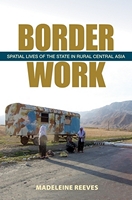 Border Work: Spatial Lives of the State in Rural Central Asia
Border Work: Spatial Lives of the State in Rural Central Asia
Cornell University Press series on Culture and Society After Socialism, 2014.
In Central Asia’s Ferghana Valley, where Kyrgyzstan, Uzbekistan, and Tajikistan meet, state territoriality has taken on new significance in these states’ second decade of independence, reshaping landscapes and transforming livelihoods in a densely populated, irrigation-dependent region.
Border Work explores the contested work of producing and policing “territorial integrity” when significant stretches of new international borders remain to be conclusively demarcated or effectively policed.
Drawing on extensive ethnographic fieldwork since 2004, the book follows traders, farmers, water engineers, conflict analysts, and border guards as they negotiate the practical responsibilities and social consequences of producing, policing, and deriving a livelihood across new international borders that are often encountered locally as “chessboards” rather than lines. Border Work shows how the negotiation of state spatiality is bound up with concerns about legitimate rule and legitimate movement, and explores how new attempts to secure the border, materially and militarily, serve to generate new sources of lived insecurity in a context of enduring social and economic inter-dependence.
Border Work was awarded the 2015 Joseph Rothshchild Prize in Nationalism and Ethnic Studies from the Association for the Study of Nationalities (ASN) and the 2016 Alec Nove Prize in Russian, Soviet and Post-Soviet Studies of the British Association for Slavonic and East European Studies. It received Honorable Mention for 2014 Heldt Prize for Best Book in Slavic/Eastern European/Eurasian Studies (Association for Women in Slavic Studies) and Honorable mention for the 2014 Central Eurasian Studies Society Book Prize.
You can read reviews of the book on the Society and Space blog (by Christine Bichsel), on Allegra (by Mateusz Laszczkowski), on the Qishloq Ovozi (village voice) blog (by Till Mostowlansky) and in Laboratorium by Boris Pétric, all of these open access. The book has been reviewed as part of a review article on post-Soviet borderlands in the Journal of the Royal Anthropological Institute by Dominic Martin, in Social Anthropology by Daniel Mahoney, in Central Asian Survey by Stanley Brunn, in Europe-Asia Studies by Alena Pfoser, in American Ethnologist by Morgan Liu, in American Anthropologist by Russell Zanca, in Etnograficheskoe obozrenie by Sergei Abashin, in Asian Affairs by Kristopher White, in PoLAR by Ieva Jusionyte, in Inner Asia by Katja Mielke, in Slavic Review by Cynthia Buckley, and in the International Journal of Turkish Studies by Marianne Kamp. It is the topic of a book discussion in Central Asian Affairs with reviews by George Gavrilis, Paul Fryer and Emil Nasritdinov, followed by my response.


